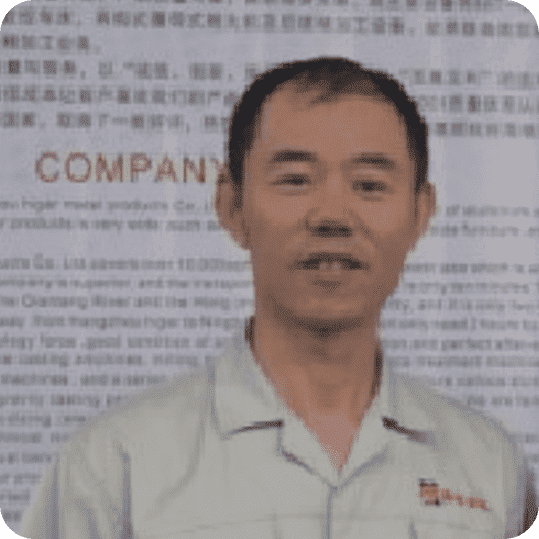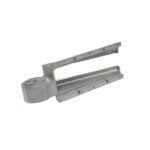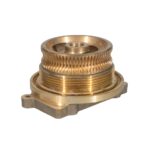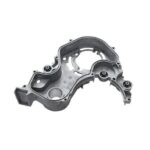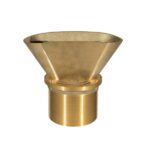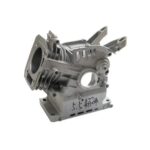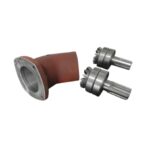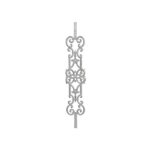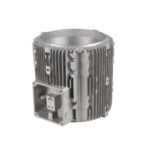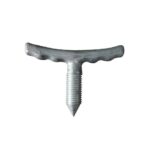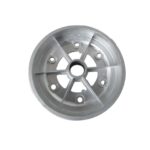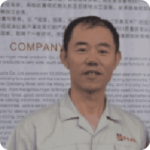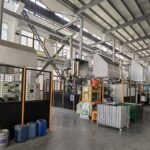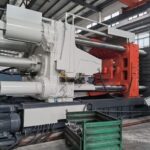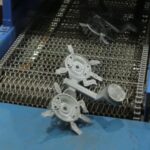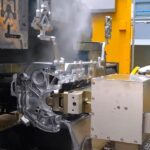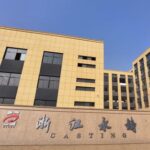When buyers reach out to us with part drawings from Russia or the CIS region, we’re often asked: “Can you cast in AK12M2?” or “Do you have experience with AK7?” These two aluminum alloys are widely used in Russian die casting—but they are not interchangeable. From our 20+ years in this industry, we’ve learned that the choice between AK12M2 and AK7 can impact everything from strength to surface finish, especially when substituting for global standards like ADC12.
What Are AK12M2 and AK7 in Russian Aluminum Standards?
Both AK12M2 and AK7 come from GOST—the Russian equivalent of ISO or ASTM. While they’re both aluminum-silicon alloys for die casting, their chemical makeup and mechanical behavior are different. Knowing these basics helps prevent problems when sourcing across borders.
Typical Composition Comparison:
| Alloy | Si (%) | Cu (%) | Mg (%) | Zn (%) | Fe (%) | Notable Property |
|---|---|---|---|---|---|---|
| AK12M2 | 10.5–13 | ≤0.2 | ≤0.3 | ≤0.1 | ≤1.0 | Similar to ADC12, good flow |
| AK7 | 6.0–8.0 | ≤0.05 | ≤0.05 | ≤0.1 | ≤0.7 | Softer, better machinability |
AK12M2 is essentially Russia’s version of ADC12 or A383—stronger and more versatile. AK7 is more like a traditional LM6, softer and easier to machine but weaker in tensile strength.
Which Alloy Performs Better in High-Pressure Die Casting?
From our experience casting for Russian buyers, AK12M2 holds better dimensional tolerances and performs more reliably in pressure-tight parts. The higher silicon content improves fluidity during injection and helps fill complex molds.
AK12M2:
- Good for thin-walled parts or parts with sharp ribs.
- Ideal for automotive covers, housings, and brackets.
- Typical strength: ~250 MPa tensile, ~2% elongation.
AK7:
- Lower strength, higher ductility.
- Used in parts that require more post-machining or where weight is less critical.
- Typical strength: ~160 MPa tensile, ~3–5% elongation.
If you’re exporting or designing parts for international clients, AK12M2 is more compatible with global equivalents.
Which Global Alloys Are Similar to AK12M2 and AK7?
Buyers often ask us if we can match Russian alloys to international grades. The answer is yes—but it requires careful analysis. Here’s a quick reference:
| Russian Alloy | Similar Global Equivalent | Common Use Case |
|---|---|---|
| AK12M2 | ADC12 (JIS), A383 (USA) | Automotive, telecom housings, LED lights |
| AK7 | LM6 (UK), EN AC-44300 | Low-load parts, general housings |
At Yongzhu Casting, we’ve done hundreds of cross-grade conversions. Let us know your drawing’s mechanical requirements—we’ll help suggest the right alternative if AK12M2 or AK7 aren’t available in your region.
Casting Behavior and Machinability Differences
One of the key distinctions buyers overlook is how these alloys behave in the real-world production line.
- AK12M2 machines harder but provides better casting yield with complex geometries.
- AK7 casts with fewer internal stresses but can warp under thermal load during machining.
- In high-volume runs (100,000+ pcs), we’ve found AK12M2 to deliver 5–7% fewer rejections due to porosity and flow defects compared to AK7, provided the tooling is optimized for it.
If your part needs precise flatness, AK12M2 wins. If post-machining cost is a bigger concern, AK7 might suit you better—but be ready to reinforce tolerances.
Real Customer Feedback from Russian Buyers
We once worked with a Russian heavy equipment parts distributor who initially requested AK7 for gearbox covers. After the first batch, they had issues with bolt holes cracking during torque application. We suggested switching to AK12M2 with an adjusted wall thickness. After the change, their failure rate dropped from 12% to under 1.5% over 50,000 pcs. The buyer later requested all similar components in AK12M2.
This wasn’t just a material upgrade—it was a trust upgrade.
How We Help You Choose the Right Alloy
With Russian standards being less familiar to many international buyers, our team does the conversion legwork. We also:
- Analyze your drawing’s thickness, load points, and tolerance zones.
- Recommend AK12M2 or its alternative based on available tooling and batch size.
- Offer 0.01–0.05 mm dimensional tolerance for CNC machined parts.
We also offer pre-production sampling and can send full composition reports with every shipment.
Summary Table – AK12M2 vs AK7
| Criteria | AK12M2 | AK7 |
|---|---|---|
| Strength | High (~250 MPa) | Moderate (~160 MPa) |
| Machinability | Moderate | Excellent |
| Casting Fillability | Excellent | Good |
| Global Compatibility | ADC12, A383 | LM6, EN AC-44300 |
| Price (Per Ton Estimate) | Slightly higher (~5–8%) | Lower |
| Use Case | Automotive, telecom, valves | Covers, boxes, light-duty |
Whether you’re sourcing in Russia or exporting internationally, alloy selection isn’t just about name—it’s about performance. If you’re not sure whether AK12M2 or AK7 fits your project better, we’ll help break it down based on data, production flow, and end use.
Searching for High-Quality for Cast Aluminum Parts?
You’ve come to the right place! Yongzhu Casting is a certified die casting manufacturer with over 20 years of expertise in the industry.
We have successfully completed numerous die casting projects for Aluminum casting parts, particularly in your industry.

Zhejiang Yongzhu Casting Technology Co., Ltd.
Location: Zhejiang, China
Company type: Manufacturers, Producers, Wholesalers
Year Founded: 2004
Main Products: Aluminium die casting, Mold Making, Die Casting, Sand Casting, Gravity Casting
Leading Chinese producer Yongzhu Casting is formerly known as Hangzhou Higer Metal Products Co., Ltd., was established in 2004.
With 20 years of experience in the industry, we are a specialized manufacturer in Aluminum casting and Machining.
Our products are widely used in various applications such as Automotive, Energy, Lighting, Medical, Home Furnishings, Machinery & Equipment etc. Below are our advantages:
Design Review & DFM Support
Our professionals will evaluate your designs and provide suggestions for cost savings. Additionally, we offer Design for Manufacturing (DFM) assistance and conduct mold flow analyses to facilitate efficient production.
State-of-the-Art Manufacturing Equipment
Our facility is equipped with advanced hot-chamber and cold-chamber die casting machinery for aluminum and zinc production.
We also utilize high-precision CNC machines in a temperature-controlled workshop, featuring 3-Axis, 4-Axis and 5-Axis setups to manage any project you have.
Rigorous Quality Control Measures
Our dedicated quality control team ensures that all parts meet the highest standards of quality and consistency. We employ high-accuracy measurement instruments, including CMM, spectrometers, and X-ray detectors.
Comprehensive Surface Treatment Options
We provide a variety of surface finishing techniques for your precision die casting components. Our in-house services include cleaning, polishing, anodizing, shot blasting, and painting.
Flexible Project Acceptance
While larger manufacturers often shy away from low-volume projects, and smaller ones may struggle with quality, Yongzhu Casting stands apart. We prioritize customer satisfaction and willingly accept high-mix, low-volume projects like yours.

